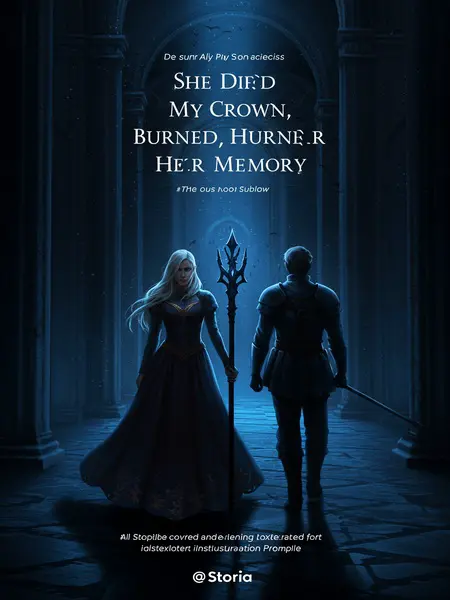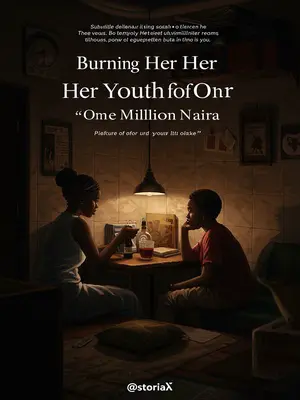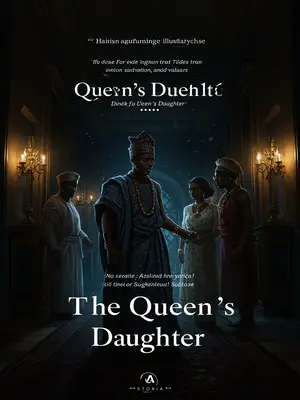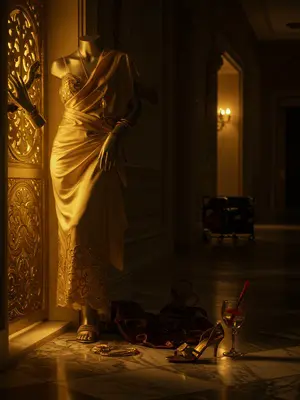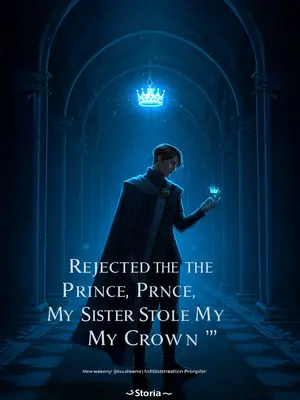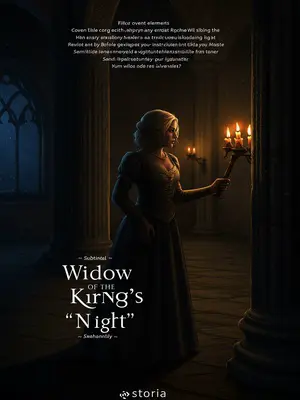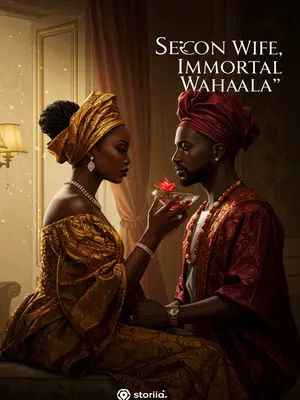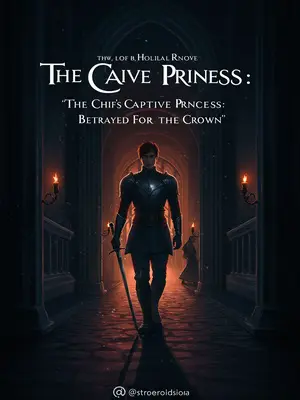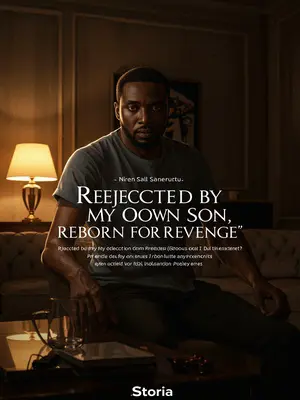Chapter 4: Childhood Fires
3
I was only eight then, when my step-sister stole the wrapper my mother left me—a special aso-oke.
That wrapper was more than cloth; it was my inheritance, my protection, the last thing my mother touched before she left this world. Losing it was like losing her all over again.
I complained to my father. He said,
"That wrapper was torn by a goat. I’ll buy you another later."
His words stung more than a slap. My grief was nothing to him, just a childish tantrum. He did not see me.
Later, passing by my sister’s room, I saw her showing off her new wrapper to the other girls, boasting about its beauty, its fine weaving, and the precious stones on it.
My anger boiled. I watched her preen in front of her friends, turning and twirling, the precious stones catching the light. They clapped and praised her, calling her the luckiest girl in the house.
Amid their exclamations, I took scissors and cut the wrapper on my sister into strips.
My rage gave me strength. I crept in, swift as a cat, and with every snip, I felt a piece of my pain slip away. The room erupted into shouts and screams, but I kept cutting, the anger in me a river with no end.
When Father arrived, my sister was pinned beneath me, too shocked to cry. Only when she saw Father did she scream for help in fear.
I held the bloody scissors, calmly looking at Father.
He looked at me, searching for tears, for fear. But I gave him none. I wanted him to see me—not the helpless girl, but the warrior his neglect had created.
"The goat ruined my wrapper. Daddy, remember to buy me another."
I said it without blinking. The room was silent, everyone staring at me as if I was a ghost. Father hesitated, unsure what to do.
Maybe my gaze was too calm. Father actually forgot to scold me. I walked out, step by step, along the wide path everyone made for me.
They parted like the Red Sea. No one dared block my way. Even the elders looked away.
The next day, an identical aso-oke was delivered to my room.
It arrived in a wooden box, wrapped in silk. There was no note, but I knew what it meant: power sometimes comes to those who take it for themselves.
I heard that my sister’s mother had to empty her savings just to heal her daughter’s injuries.
They said she wept for days, selling her jewelry, her trinkets, anything to pay the herbalist. But I did not care. Justice, sometimes, is bitter.
After that, I never saw her near my room again.
She learned quickly. The children in the estate gave me a wide berth. I became a shadow, a warning.
Stories about me spread throughout the estate, saying I was wicked and bloodthirsty, often sneaking out at night to harm people. It was then that Ifeoma appeared by my side.
They called me ‘winch’ but I just hissed and said, ‘Your papa!’ Ifeoma, fresh-faced and fearless, stood beside me. She was not afraid of the darkness around me. She saw through it.
The daughter of the local pastor once pushed me into the stream. I grabbed a rock, climbed ashore myself, and threw her into the water.
She tried to drown me, but I refused to die. My hands found a rock, and with all the anger in my heart, I turned the tables. Her screams echoed down the river.
She nearly lost her life.
The pastor’s daughter was pulled from the water, blue-lipped and coughing. The whole community was in uproar.
The pastor petitioned the elders, demanding my father punish me severely.
He gathered the elders, his voice thundering with righteous fury. The whole village watched, waiting to see my fall.
The elders asked about the incident, but no one dared speak for me. Only Ifeoma stepped forward.
She marched up to the elders, bold as brass, her head held high. Her voice rang out, clear as a bell.
"It was Miss Amaka who was rude to Miss Fola first. If there is to be punishment, it should be equal."
Her testimony saved me. The elders, wise in their own way, nodded. Justice, in their eyes, was a scale—not a sword.
The elders understood the whole story and did not punish me. Instead, they ordered the pastor to discipline his own children strictly.
For the first time, I felt the power of being seen, truly seen, by someone who cared. Ifeoma’s courage changed everything.
Before, I only knew that if someone bullied me, I would finish them.
It was simple math: hurt or be hurt. But Ifeoma showed me another way—a softer path, where strength and mercy could walk side by side.
But Ifeoma taught me not to punish others at my own expense.
She would say, “Fola, don’t use your own hand to carry firewood that will burn you.” It was her wisdom, old as the hills, and it kept me alive.
It’s not worth it.
That lesson followed me everywhere. I learned when to fight, and when to wait. I learned how to win without losing myself.
Make others suffer, but never let them blame you.
She grinned, eyes shining. “Let them fear you, but let your hands remain clean.” Ifeoma, my wise friend, always three steps ahead.
I warned her not to come near me.
"I am wahala."
Ifeoma did not listen.
She just laughed, arms akimbo. “If you be wahala, I get medicine for am.” Nothing could chase her away.
"No wahala, I come with my own medicine."
She smiled, her eyes full of mischief. From that day, we became a pair—two sides of a coin, both marked by fate.
Later, whenever I got into trouble, Ifeoma always cleaned up after me.
No mess was too big for her. She covered for me, lied for me, fought for me. People started to fear my name, but respect hers.
No one called me cold-blooded anymore. They all said I was a pitiful child who lost her mother, bullied by my stepmother and sister.
The stories changed. Now I was a victim, not a villain. All because of Ifeoma’s quiet work.
I once asked Ifeoma why she helped me. Ifeoma said, with my reputation and family, maybe one day I could marry into the royal family, and she wanted to hold onto my wrapper.
I laughed then, thinking she was joking. But Ifeoma, eyes bright, was always playing the long game. She saw things I could not.
I didn’t believe her.
I thought it was just another trick, another joke. But her loyalty was deeper than the Niger.
Until I came of age and was engaged to the Crown Prince, Ifeoma finally told me the truth.
That night, under the moonlight, she held my hands and confessed. The truth spilled out, strange and wondrous.
She said she was from another world, and came here only to save me. If she did not intervene, I would destroy the entire kingdom. Now that my life was back on track, she was preparing to leave.
Her eyes were serious, her words heavy. I laughed at first, thinking it was a story for children. But the conviction in her voice silenced me.
Ifeoma said, when her body here died, she would return to her original world.
She spoke as if she had already made peace with it. “Death no be the end,” she said. “Just a new journey.”
She liked it there very much, and I could not force her to stay.
She described her other world—filled with lights, songs, and a kind of freedom that sounded like paradise. But she stayed, for me, longer than she should have.
It was Musa Danjuma who made her stay.
His love, his need, pulled her back. Even the strongest spirit can be tempted by the promise of belonging.
At the time, I was also happy for her.
I celebrated her joy, believing she had finally found her home. I toasted her with palm wine, prayed for her happiness.
But I never imagined there would be a Sade.
I did not see the shadow at the edge of the fire, the new player in the old game.
